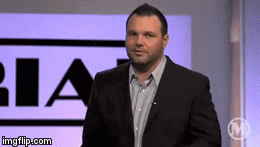Dave Gushee has just written the 10,000th think-piece lamenting and struggling to comprehend white evangelical enthusiasm for the presidential candidacy of Donald Trump. (Balloons and confetti drop, music plays, Dave is presented with an oversized check and a gift certificate for dinner for two at a local steakhouse.)
But even if you’ve read all of the previous 9,999 articles on this subject, you may still want to look at what Gushee has to say in his RNS op-ed, “Trump, Cruz popularity represents two very different Christian failures.” The bit on Ted Cruz there is mainly for contrast, and I think it understates the way Cruz actually represents something new, and disturbing, on the religious right — that the politics of Charismanews has now eclipsed the politics of Christianity Today as the main expression of white evangelical spirituality. But Gushee’s take on the meaning of evangelical support for Trump is, I think, spot on:
In his demeanor, he is violating every prior accepted standard of presidential civility. He is lathering up audiences for systematic demeaning of specific targeted groups, notably Muslims and Hispanics, through security appeals over terrorists and undocumented immigrants. He has also dismissed moral concerns about torture, and other rule-of-law considerations in war and foreign policy. He has more than once expressed respect for the leadership and toughness of foreign dictators. In sum, here is a presidential candidate frequently characterized by xenophobia, cruelty, vulgarity, and authoritarianism.
That doesn’t even get into the fact that Trump is a billionaire who made his fortune running casinos (traditionally viewed as sinful and shameful by anti-gambling white evangelical leaders) and as a slumlord (traditionally viewed as sinful and shameful by, well, everybody). Or that he’s a thrice-married hedonist and a sexual braggart with a thing for younger women. Or that he’s spent four decades in the spotlight as pretty much the poster boy for the opposite of every notion of evangelical piety.
So then the question arises again: how exactly can self-identified followers of Jesus support this man? …
There are two main ways to interpret what is going on here. One lays most of the blame at the feet of these self-identified Christians. That is, in supporting this kind of person for president they are denying the teaching they have received. They are being disobedient, or at best, nominal Christians.
The other interpretation, though, is even more disturbing. That would be the idea that in the Christian moral formation of these supposed Christians they have not been offered an adequate inoculation against this kind of politics. What they needed was instruction in a version of Christianity with ironclad commitments to civility, solidarity, justice, mercy, compassion, rule of law, and human rights, commitments so strong and so well-engrained in believers that to support someone like Trump would be unthinkable. But they have not received that inoculation.
B. The second one. That.
What we’re seeing here is a failure of, as Gushee says, “moral formation.” When one student fails the final exam, the fault may lie with that student. When the entire class fails the final exam, the fault lies with the professor.
And when we see a massive failure of moral formation on the scale of what we’re seeing with white evangelical support for Trump, the fault lies with the entire faculty, the entire curriculum, and the culture of the entire school.
But we didn’t need Trumpamania to show us this. This is just the largest and latest example of something we’ve seen rotting away in white evangelicalism for generations.
 “I think Trump may have found his running mate,” Digby said this weekend at the end of a post goggling over a Daily Beast profile of a prominent and influential evangelical pastor. That wisecrack is apt because, as Digby says, Mark Driscoll’s popularity and influence among evangelicals is based on the same bullying authoritarian ethos that appeals to fans of The Donald.
“I think Trump may have found his running mate,” Digby said this weekend at the end of a post goggling over a Daily Beast profile of a prominent and influential evangelical pastor. That wisecrack is apt because, as Digby says, Mark Driscoll’s popularity and influence among evangelicals is based on the same bullying authoritarian ethos that appeals to fans of The Donald.
You are, at this moment, reading a religious blog, and most readers of religious blogs need a respite from Mark Driscoll more than an introduction to this man. (I last wrote about him at length, I think, here.) But Brandy Zadrozny’s “Controversial Megachurch Pastor Mark Driscoll Finds a New Flock” does a good job profiling Driscoll for those who may not have heard of him before, and a good job reporting on his recent return to “ministry” and to wider influence among evangelicals.
If you’ve read this far, then it’s unlikely you need me to try to persuade you one way or the other about how to respond to people like Driscoll and Trump. Either their bullying persona, their misogyny and fragile masculinity, and their thuggish, violent condemnation of supposedly unclean outsiders instinctively appeals to you or else it instinctively repulses you, and nothing I write here is likely to dissuade you from that initial response.
But that instinct isn’t really just instinct. It’s the product of training, of education, of practice — what Gushee above calls “moral formation.” What all that entails and how that all works is too vast a subject to address here. My point here is that the popularity of Driscoll and the popularity of Trump are glaring warning signs that the institutions, curriculum, and culture that shape our moral formation — that shape us — have gone horribly awry.
Something is pervasively rotten here. This is not a hole that needs to be patched. This is a load-bearing structure that will have to be torn down and rebuilt anew.
(And rebuilding it right will, of course, involve getting help from those who weren’t involved in the original construction.)












